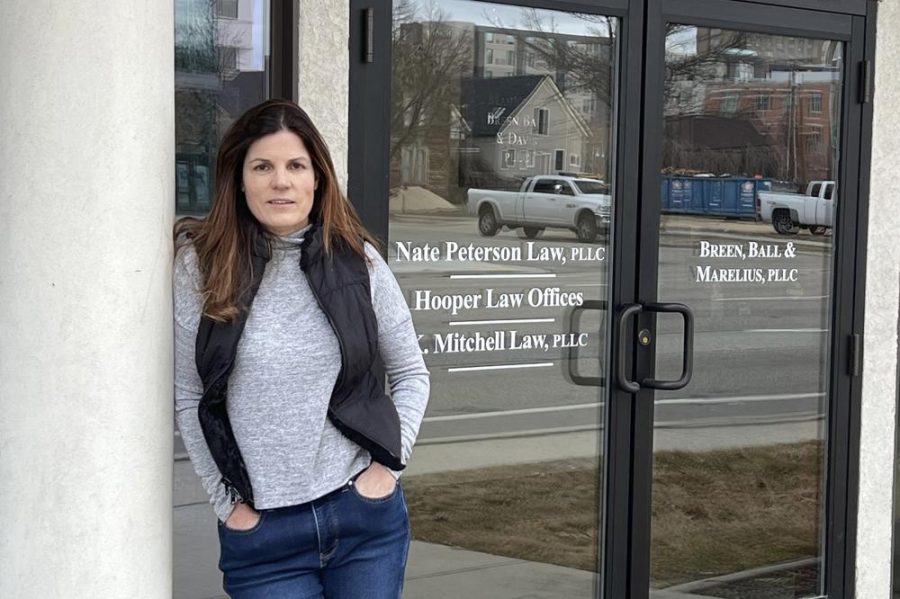BOISE, Idaho (AP) — Ryan Small was trying to keep his ex-wife from moving out of state with their son early last winter when he found out the 16-year-old boy had been secretly married off to another teen, with his mother’s permission, in an apparent bid to end the custody battle.
A few months earlier, Erin Carver was embroiled in a battle with her ex-husband over whether their 16-year-old girl would remain in Idaho or move to Florida with her father when she learned a similar “sham marriage” had taken place.
The children both slipped through a common legal loophole in child marriage laws across the United States: It often only takes one parent to consent to let a 16- or 17-year-old child get married, and once that child is married custody agreements are moot.
It’s difficult to determine how many minors are married by a parent seeking to void custody agreements, in part because family court proceedings are often sealed. But Unchained At Last, an organization that seeks to end forced and child marriages, estimates nearly 300,000 minors were married in the U.S. between 2000 and 2018.
The child custody loophole is just one of many problems that exist with child marriage, said Fraidy Reiss, the founder of Unchained At Last. Marriage before age 18 remains legal in 44 states.
“Parents use child marriage for all kinds of reasons, all kinds of ways they can benefit financially,” Reiss said. “The list of horrors goes on and on.”
Children are trafficked into marriages to foreign spouses to try to skirt immigration laws, rape victims are married to abusers in attempts to cover up the assaults, and for other illicit reasons, Reiss said.
“The problems with the current law are many, but they all come down to the fact that it’s a parent making this really important decision with no input from the minor, and the minor has no legal rights until they are 18,” Reiss said.
Carver was in her car when she got the news that her 16-year-old daughter had married an 18-year-old boy in a southwestern Idaho courthouse with her father’s permission and no other witnesses. She pulled to the side of the road and cried.
“No child under 18 should be married, even with parental consent, because parental consent is often parental coercion,” Carver said. “They’re just little kids.”
Last week Carver’s attorney asked the Idaho Supreme Court to declare that her ex-husband lacked the legal authority to consent to the marriage. The court is expected to issue a ruling in Carver’s case in the next two weeks.
Carver, who had gotten wind of the marriage plans a few days before the wedding, had filed an emergency motion asking a custody judge to stop her ex from consenting.
But the motion apparently got lost on the custody judge’s desk, and he didn’t issue a ruling until it was too late. After the wedding, the judge said he would have ruled that a marriage would have caused the child “irreparable harm.” But because the marriage had occurred, the judge felt he lacked jurisdiction.

In Idaho Supreme Court arguments, the attorney representing Carver’s ex-husband William Hornish bristled at suggestions the teen girl’s marriage was a “sham” designed to circumvent custody rules.
Still, attorney Geoffrey Goss acknowledged there was no evidence showing the marriage was based on a relationship. He stressed that Hornish had legal authority to consent to the marriage.
Goss didn’t respond to a phone message from The Associated Press.
Carver’s attorney, Shawn Breen, said he suspects Hornish found his daughter’s young husband via social media. The teens attended the same high school, though they were in different grades. Neither Breen nor Carver have been able to talk to her daughter, though Carver’s daughter has talked to her siblings.
“Her siblings are close to her and so she says, you know, ‘I love mom, I want to be in Florida,’” Carver said.
Before the wedding, they had a typical mother-daughter relationship, Carver said. Her daughter was an active teenager who loved hanging out with friends, playing volleyball and ordering UberEats, though they disagreed whether she should move to Florida before graduation.
Now Carver is worried about the effect of the marriage.
“Not only what it could do for taxes, health insurance or scholarships — those sorts of things, those big ramifications,’” Carver said.
Ryan Small knew trouble was on the horizon when he started getting letters from his 16-year-old son’s school alerting him to absences. When the teen came for his scheduled visit, he said his mother — Small’s ex wife — had switched him to online school. But when Small checked with school officials, they were relieved to finally hear from a parent, he said. The school officials said the teen wasn’t in online school, and both parents had to sign documents to make the switch.
The teen then revealed his mother was planning to move them both to Spokane, Washington, where she found a job, Small said. Worried his son would drop out, Small tried to stop the move through the courts.
Small last saw his son for a scheduled visit on Nov. 15, 2021. Four days later, the 16-year-old married a 17-year-old girl after getting a marriage license in a northern Idaho courthouse. Small’s ex-wife officiated.
Small asked a custody judge to declare the marriage fraudulent, that it be annulled or that his wife be held in contempt of court. The judge declined, citing a 2016 Idaho Court of Appeals ruling in another case where an estranged parent had secretly arranged a child marriage.
Small’s son has been self-emancipated — the term for a minor who has married and is now treated like an adult in limited legal situations — for a little over three months now.
“I know it’s causing stress on my son, and I don’t want to stress him out,” Small said. “But children can’t consent, and making a lifelong decision for your child? That’s just horrible.”
The AP could not locate contact information for Small’s ex-wife, and her attorney didn’t respond to a request for comment.
Small said he’s searching for his son, but his text messages have gone unanswered.











